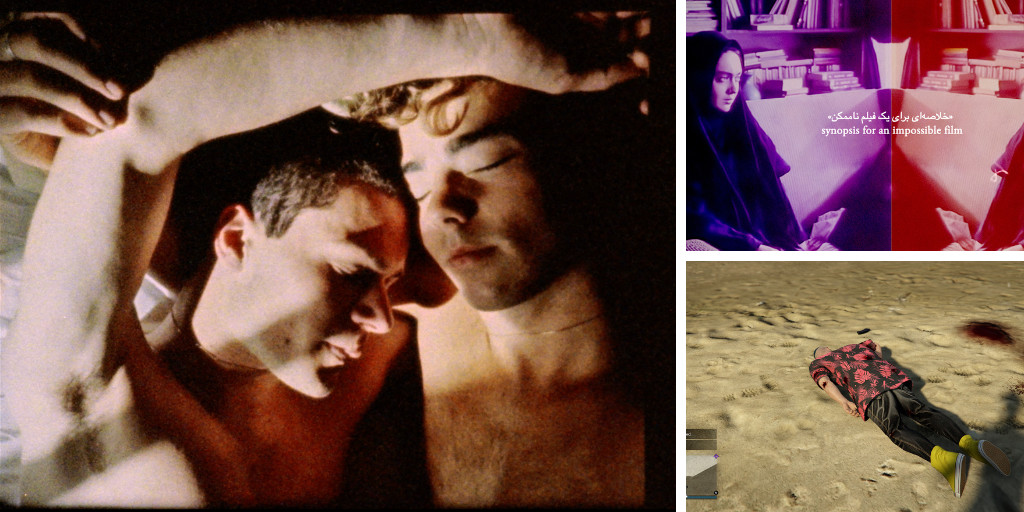On September 24, the 14th edition of BIEFF – Bucharest International Experimental Film Festival begins, the first and largest event in Romania dedicated to avant-garde film. We spoke to those who made the selection of this year’s films, Oana Ghera, the artistic director, and the curators Teodora Leu, Flavia Dima and Călin Boto, about their favorite titles from program and where they would go if they were in the spectator position.
A Swedish buffet of montage cinema
Flavia Dima: Of course, this is the most difficult question of all for a curator. Because, ultimately, you are extremely connected to the whole ensemble (discursive, formal, aesthetic, political) that you build within a festival. (Besides, it’s always a little bit tricky say which are your favorites from the competitive sections.)
So I will take this opportunity to mention that at this edition of BIEFF we have the largest number of films presented in special screenings in the last few years – and all of them seem to me “must dos”: starting with the opening film , Things We Said Today of Andrei Ujicawhich is a film that Romanian cinephiles have been waiting with open arms for more than a decade, until the closing film, It’s not me of the incomparable punk kid Leos Carax, an iconoclastic essay in the vein of Jean-Luc Godard’s late films that took our breath away when we saw it.
And between these, a real Swedish buffet of montage cinema: the two films presented by Radu Jude at Locarno (Sleep #2 and Eight illustrated from the ideal world, co-directed with Christian Ferencz-Flatz), Ana Lungu’s newest film, Triton (presented at FIDMarseille) and To Fidai Film by Kamal Aljafari, a Palestinian filmmaker at the forefront of this vital movement in contemporary nonfiction cinema. That said, perhaps this is in fact the red thread of the edition: montage cinema – and the fact that our selection brings together its most important names is not only an indication of the enormous importance of this genre in contemporary film , as well as a tribute.
Dora Read: In addition to the competitions that I have prepared, I am personally very excited about Focus-ul Machinima – Gamepad Filmmakingwhich tracks movies made inside video games and more interference between cinema, video games, and other resources occasioned by desktop and computer. It seems to me that the most interesting examples of the avant-garde and the most delicious dilemmas of media discourse come from here – the subject is an extraordinary oasis of popular culture, media theory, philosophy and, of course, crude internet jokes.
On Mars or Zoom
Calin Boto: I really liked Radu Jude’s new movie, Sleep #2a video-essay made on the desktop, and I can’t wait to host its Bucharest premiere. And we have another similar film, the short film The Mars Project (International Short Film Competition) by the very young Louis Remy, basically a montage of YouTube clips where people are video-casting for a bogus campaign by a certain Dutch organization, Mars One, which promised to send civilians to a colony on Mars. And without being as formally radical as the first two, many other films in our selection engage such ideas and emotions about our everyday images. It is often said, especially in film criticism, that there is cinema everywhere, in all sorts of bastard pixels, Zoom conferences, screenshots, reeletc., but it seems to me that film festivals are still very reluctant to anything that is not 4K. Not BIEFF, thankfully.
Affective memory
Oana Ghera: It is always difficult for me to choose a favorite film or several as our selection process involves extensive discussions about each film, so that each title on the festival agenda reflects a well-thought-out choice made by the entire team.
On a personal level, I would randomly call the latest film by the duo Caroline Poggi and Jonathan Vinel, Eat the Night, which was at the center of one of the most exciting viewing experiences I had at this year’s Cannes Film Festival or bluisha small intimate gem discovered in the FID Marseille selection, which, not coincidentally, retains something of the fascination produced by one of my favorite books, Bluets by the writer Maggie Nelson.
And the list can go on with director Maryam Tafakory’s latest film, Razeh-Del, who proves once again that he is one of the strongest voices working consistently with the video essay format, turning it into a deeply personal way, with Crushed directed by Camille Vigny or with Loveboarddirected by Felipe Casanova, two other short films from the selection of the International Short Film Competition, which propose two creative, and equally poignant, formulas to transpose aspects of affective memory on the screen.
Otherwise, I am very glad that this year I had the pleasure of collaborating with Vladimir Nadein and Dmitry Frolov, who curated a focus program (Machinima: Gamepad Filmmaking) that I had already been dreaming of for several years, dedicated to the genre machinima, which brings together a selection of films that traces the interferences between cinema and video games and, more broadly, cinema and new media. Come play and explore with ustherefore.
Oana Ghera is the Artistic Director of the Bucharest International Experimental Film Festival (BIEFF) since 2020. She is a film curator, cultural manager and cinema educator, with academic training in screenwriting and film studies. Industry coordinator within the European Short Pitch starting with the 2023-2024 edition. In 2024, he joined the selection committees of the Go Short and Vienna Shorts festivals and participated in the curation of the SFC film catalog | Rendez-vous Industry, in the context of the Cannes Film Festival. Previously, he was co-programmer for the NexT International Film Festival (2016 – 2019).
Dora Read she is a film critic, curator and filmmaker. He is currently researching the role and aesthetics of VHS tapes in contemporary audiovisual at Trinity College Dublin. He graduated with a BA in Film Directing and a MA in Filmology at UNATC. He also studied art history in parallel. He collaborates with several film publications, including Films in Frame and Glass Roof, and is a former managing editor of FILM MENU magazine. He is part of the BIEFF curatorial team and assistant curator for F-Sides Cineclub. It deals consistently with Asian cinema, with a focus on Japan and Hong Kong. She is an alumna of Locarno Critics Academy, Berlinale Talents, Young Critics Ghent, Far East Campus, etc.
Flavia Dima she is a film critic, cinema curator and freelance translator/researcher. Her texts have appeared in publications such as MUBI Notebook, Sabzian, Reverse Shot, FILM MENU, Films in Frame, Scena9, Matca Literară, Acoperișul de Sticlă and Echinox. He is associate curator of BIEFF since 2020 and collaborates with festivals such as ESTE Film Festival and Art200. Her debut volume of poetry, ulaanbaatar, is forthcoming from OMG Publishing.
Calin Boto is a film curator, festival selector and book editor. Trained in film criticism, he writes occasionally for publications such as Filmexplorer (Switzerland) and Films in Frame (Romania). He is an associate curator of BIEFF – the Bucharest International Experimental Film Festival – and a selector of the Critics’ Week in Berlin (Woche der Kritik). He participated in criticism, history and film curation workshops organized by festivals in Warsaw, Locarno, Sarajevo, Poznań, Pordenone, etc. In 2024, he was the curator of the first Il Cinema Ritrovato retrospective in Bucharest. He works as an editor for UNATC Press, the publishing house of the National University of Theater and Cinematography “IL Caragiale” from Bucharest.
Source: www.iqads.ro





